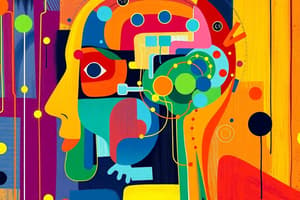Podcast
Questions and Answers
Which of the following events did NOT occur in the history of artificial intelligence during the 1950s?
Which of the following events did NOT occur in the history of artificial intelligence during the 1950s?
- Establishment of the Turing test by Alan Turing
- Introduction of the perceptron by Frank Rosenblatt
- Development of the first chatbot ELIZA (correct)
- Creation of the Logic Theorist by Newell and Simon
What significant AI concept was coined at the Dartmouth Conference?
What significant AI concept was coined at the Dartmouth Conference?
- Natural Language Processing
- Machine Learning
- Artificial Intelligence (correct)
- Neural Networks
Which AI breakthrough was demonstrated by Deep Blue in 1997?
Which AI breakthrough was demonstrated by Deep Blue in 1997?
- Beating a world chess champion (correct)
- Training of convolutional neural networks
- Creation of the first chatbot
- Recognition of handwritten characters
Who popularized the backpropagation method for training neural networks?
Who popularized the backpropagation method for training neural networks?
Which programming language was specifically created for logic programming in 1972?
Which programming language was specifically created for logic programming in 1972?
Which of the following is NOT a task that artificial intelligence systems aim to mimic?
Which of the following is NOT a task that artificial intelligence systems aim to mimic?
Which neural network type was demonstrated to learn and process information in a new way by John Hopfield in 1982?
Which neural network type was demonstrated to learn and process information in a new way by John Hopfield in 1982?
Which event in the history of AI involved the recognition of handwritten characters?
Which event in the history of AI involved the recognition of handwritten characters?
What significant event happened in 2012 that impacted the field of computer vision?
What significant event happened in 2012 that impacted the field of computer vision?
Which field of AI primarily involves the design of systems for decision-making support?
Which field of AI primarily involves the design of systems for decision-making support?
What ethical issue in AI deals with ensuring technology is developed and applied in a fair manner?
What ethical issue in AI deals with ensuring technology is developed and applied in a fair manner?
Which AI subfield is primarily concerned with the manipulation and recognition of visual information?
Which AI subfield is primarily concerned with the manipulation and recognition of visual information?
Which advancement in AI was demonstrated when AlphaGo defeated the Go champion Ke Jie?
Which advancement in AI was demonstrated when AlphaGo defeated the Go champion Ke Jie?
What does the term 'value alignment' in AI ethics refer to?
What does the term 'value alignment' in AI ethics refer to?
In what year was the influential paper 'Attention is All You Need' published?
In what year was the influential paper 'Attention is All You Need' published?
Which of the following is NOT a sub-field of artificial intelligence?
Which of the following is NOT a sub-field of artificial intelligence?
Flashcards
Artificial Intelligence (AI)
Artificial Intelligence (AI)
Creating computer programs to simulate human intelligence, including problem-solving and learning.
Turing Test
Turing Test
A test to determine if a machine can exhibit intelligent behavior equivalent to, or indistinguishable from, that of a human.
Logic Theorist
Logic Theorist
An early AI program that could prove mathematical theorems.
Dartmouth Conference
Dartmouth Conference
Signup and view all the flashcards
Perceptron
Perceptron
Signup and view all the flashcards
Chatbot
Chatbot
Signup and view all the flashcards
Expert System
Expert System
Signup and view all the flashcards
Convolutional Neural Networks (CNNs)
Convolutional Neural Networks (CNNs)
Signup and view all the flashcards
AI Subfields
AI Subfields
Signup and view all the flashcards
AI Ethics
AI Ethics
Signup and view all the flashcards
DARPA Grand Challenge (2005)
DARPA Grand Challenge (2005)
Signup and view all the flashcards
ImageNet Challenge (2012)
ImageNet Challenge (2012)
Signup and view all the flashcards
Transformer Model
Transformer Model
Signup and view all the flashcards
AlphaGo (2017)
AlphaGo (2017)
Signup and view all the flashcards
Generative Pre-trained Transformer (GPT)
Generative Pre-trained Transformer (GPT)
Signup and view all the flashcards
AI Key Issues
AI Key Issues
Signup and view all the flashcards
Study Notes
Artificial Intelligence - Overview
- Presented by Emmanuel Ali (PhD)
- October 7, 2024
- 1st Semester
Outline
- Introduction to AI
- Search Algorithms
- Evolutionary Algorithms
- Knowledge representation and inference
- Machine Learning Fundamentals
Introduction to Artificial Intelligence
- AI is a concept enabling machines to exhibit human-like intelligence.
- This involves creating algorithms and programs to handle complex and simple tasks.
- AI aims to mimic human cognitive functions, improving performance through learning and adaptation.
- AI systems handle problem-solving, learning, reasoning, understanding natural language, and pattern recognition.
History of Artificial Intelligence
- 1950: Turing test introduced as a measure of intelligence.
- 1955: Newell and Simon created the Logic Theorist.
- 1956: Dartmouth Conference coined the term "Artificial Intelligence."
- 1958: Rosenblatt introduced the perceptron (early neural network).
- 1966: ELIZA, the first chatbot, developed by Joseph Weizenbaum.
- 1972: Prolog, a logic programming language, was created.
- 1980: XCON for Digital Equipment Corporation.
- 1982: Hopfield neural network.
- 1989: LeCun, Bengio, and Haffner demonstrated CNNs (convolutional neural networks).
- 1997: Deep Blue beat Garry Kasparov.
- 2005: Stanford team won the DARPA Grand Challenge.
- 2012: AlexNet and ImageNet challenge.
- 2017: Transformers and AlphaGo.
- 2019: Advancements in Generative Pre-trained Transformer (GPT) language models.
Subfields of AI
- Cognitive Science & Brain Understanding: Brain modeling
- Evolutionary Computation: Genetic algorithms, genetic programming
- Perception & Vision: Object recognition, image understanding
- Robotics: Intelligent control, autonomous exploration
- Expert Systems: Decision support systems, teaching systems
- Speech Processing: Speech recognition, production
- Natural Language Processing: Machine translation
- Planning & Decision Making: Scheduling, game playing
- Machine Learning: Decision tree learning, version space learning, time series prediction, classification
Ethics in AI
- AI ethics aims to minimize risks and achieve optimal outcomes.
- Key issues encompass data responsibility/privacy, moral agency/value alignment, fairness, explainability, robustness, transparency, environmental sustainability, inclusion, accountability, trust, and technological misuse.
Studying That Suits You
Use AI to generate personalized quizzes and flashcards to suit your learning preferences.
Related Documents
Description
Explore the foundational concepts of Artificial Intelligence in this quiz, covering topics such as search algorithms, evolutionary algorithms, and machine learning fundamentals. Discover the history and evolution of AI from its inception to its modern applications, and test your understanding of its key principles.




